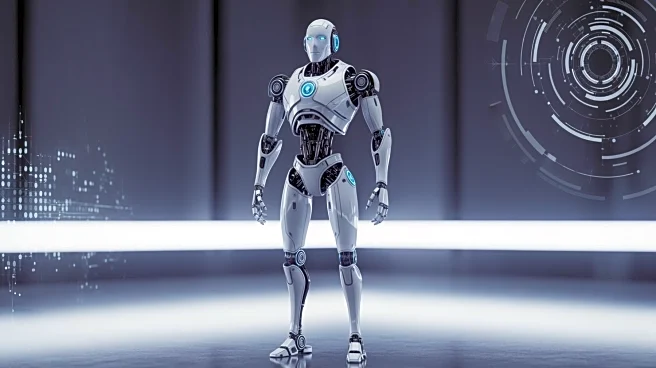What's Happening?
Elon Musk, CEO of Tesla Inc., has announced ambitious plans for the company's humanoid robot, Optimus, which he believes could significantly transform the global economy. Despite technical challenges,
Musk envisions Optimus as a tool that could drastically increase economic productivity by operating continuously and outperforming human labor. During a Tesla shareholder meeting, Musk expressed confidence in the robot's potential to eradicate poverty and transform the criminal justice system by monitoring and preventing crime. He predicts that Optimus will be operational 24/7 and outperform humans by five times annually, contributing to a vision of 'sustainable abundance' supported by robotics and AI.
Why It's Important?
The introduction of Tesla's Optimus robot could have profound implications for various sectors, including labor markets, economic productivity, and social systems. By potentially reducing the need for human labor, Optimus could lead to significant shifts in employment patterns and economic structures. Musk's vision of universal high income suggests a future where working becomes optional, which could redefine societal norms and economic policies. However, such transformative change may also bring significant disruption, requiring careful consideration of ethical and social impacts. Stakeholders in technology, labor, and public policy will need to address these challenges as the robot moves closer to mass production.
What's Next?
As Tesla continues to develop Optimus, the company faces technical hurdles, particularly with the robot's hands. Despite these challenges, Musk remains optimistic about launching mass production soon, with an ambitious price target of $20,000 to $30,000 per robot once production scales. The potential impact on labor markets and economic systems will likely prompt discussions among policymakers, businesses, and civil society groups about the future of work and income distribution. The broader implications of AI and robotics in reshaping economies and societies will be closely monitored as Tesla progresses with Optimus.
Beyond the Headlines
The development of Optimus raises ethical and cultural questions about the role of AI and robotics in society. Musk's vision of a capitalist-driven 'communist utopia' offers an ironic twist on the future, highlighting the potential for technology to address global economic crises. However, the shift towards automation and AI-driven productivity may also lead to significant social and economic disruptions, necessitating careful consideration of the long-term impacts on employment, income inequality, and social justice.










